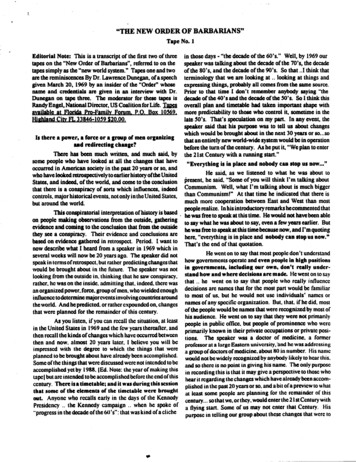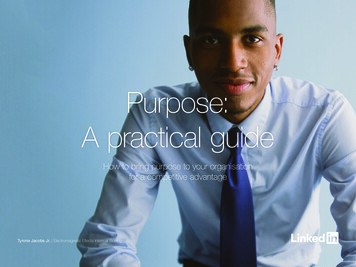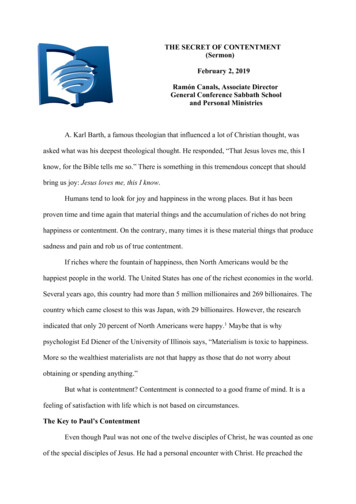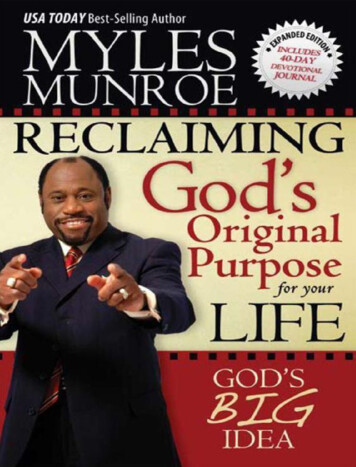
Transcription
The Purpose TapesPurpose driven leaders in their own wordsMay 2021
The Purposeful Company was launched in 2015. A consortium of leading FTSEcompanies, investment houses, business schools, business consultancy firms and policymakers, it has been examining how the governance and capital markets environment inthe UK could be enhanced to support the development of value generating companies,acting with purpose to the long-term benefit of all stakeholders.The Steering Group, co-chaired by Clare Chapman and Will Hutton, oversees its work.Members of the Steering Group act in their personal capacity, and their views maynot be taken to represent the views of their organisation. Equally the conclusions andrecommendations that the Steering Group draw from its work, this report included,are ours and not every specific proposal or comment should be taken to represent theviews of each of our interviewees or our task force members, although they do supportour overarching principles and aims.Steering GroupClare Chapman, Non-Executive Director and Acas Chair (Advisory, Conciliation and Arbitration Service)Alex Edmans, London Business SchoolTom Gosling, London Business SchoolWill Hutton, LSE and President Designate of the Academy of Social SciencesColin Mayer, Saïd Business School, Oxford UniversityContact thepurposefulcompany.org2. The Purpose Tapes
The Purpose TapesPurpose driven leaders in their own wordsThe Purpose Tapes are interviews (conducted between November 2020 and March 2021)with fourteen organisational leaders who have a stated commitment to purpose.Here are their purpose statements:Barclays, CEO, Jes Staley“We deploy finance responsibly tosupport people and businesses,acting with empathy and integrity,championing innovation andsustainability, for the common goodand the long term.”Capita, CEO, Jon Lewis“We are driven by our purpose: tocreate better outcomes – for ouremployees, clients and customers,suppliers and partners, investors, andsociety.”Federated Hermes, CEO, Saker Nusseibeh“we help people retire better.”Fidelity International, CEO, Anne Richards“helping people to build betterfinancial futures.”Hogan Lovells, Global Managing Partner forDiversity & Inclusion and Responsible Business,Susan Bright“working with our stakeholders andsociety with the objective of using thelaw to build a better world.”IFM, CEO, David NealEY, UK Chair and UK&I Regional Managing Partner,Hywel Ball“our purpose is building a betterworking world. The insights andquality services we provide help buildtrust and confidence in the capitalmarkets and in economies the worldover. We develop outstanding leaderswho team to deliver on our promisesto all our stakeholders.”“to protect and grow the retirementsavings of working people.”Infosys Ltd, President, Mohit Joshi“to navigate your next.”National Grid, CEO, John Pettigrew“to bring energy to life.”The Purposeful Company3.
NHS England, CEO, Sir Simon Stevens“high quality health for all, now and forfuture generations.”NatWest, CEO, Alison Rose“to champion the potential of people,families and businesses.”PwC, Senior Partner, Kevin Ellis“to build trust in society and solveimportant problems. In an increasinglycomplex world, we help intricatesystems function, adapt and evolveso they can benefit communities andsociety – whether they are capitalmarkets, tax systems or the economicsystems within which business andsociety exist.”4. The Purpose TapesSevern Trent, CEO, Liv Garfield“to serve our customers andcommunities. This drives our vision tobe the most trusted water company by2020 and every year thereafter.”Unilever, CEO, Alan Jope“to make sustainable livingcommonplace.”
IntroductionThe Purposeful Company was established in 2015with the encouragement and support of the Bankof England to promote the proposition that “profitis the outcome of identifying and pursuing a purposethat benefits society”. This rather than profit is acompany’s purpose.Over the last six years our reports have helpedcreate an evidence base that has influencedpolicymakers, regulators and business itself.Purpose in business is becoming more widelyadopted and practised. This is part of the called-for“reset” of capitalism intensified by a sense in civilsociety and business alike that whether inequality,levelling up, diversity or climate change, businessshould play its part – intensified by business’s ownexperience of the financial and Covid-19 crises.Business needs the trust of the societies in whichit trades and putting purpose at the core of abusiness is seen increasingly not only as criticalto managing the claims and interests of varyingstakeholders, energising workforces and investorsalike, but indispensable in earning a licenceto operate. It is the best means to determinecorporate strategy.Thus the new Corporate Governance Code invitessignatory companies to declare their purpose, aninnovation introduced partly as a result of evidencemarshalled by The Purposeful Company. Nearlynine out of ten quoted companies now do so. Ourevidence also influenced the new StewardshipCode. However, the concept that purpose shouldbe the source of a company’s strategy and profitsis still young and turning it into policy and actionseven younger. So, how do self-proclaimed purpose-led businessesunderstand and implement their purpose? how does it influence the way they approachstaff, customers, supply chains, shareholdersand wider society – indeed the way they shapetheir business model? Does it make good sensefor their business and for shareholders? to what extent did they deploy purpose tonavigate the Covid-19 pandemic? what are the blockers to purpose going beyond astatement of good intent actually to being livedand more widely adopted?With The Purpose Tapes study we wanted tounderstand what motivated organisational leadersto put purpose at the heart of their organisations,and what they believed they were getting in return.This is not a study that aims conclusively to provethe beneficial impact of purpose on performanceor to offer a fail-safe guide on how to make acompany purposeful. We are aware that there are“halo effects” from studying companies that haveself-identified as being purposeful. Instead, this isan exploration of these leaders’ thinking, insights,challenges and resulting strategies as they chooseto portray them. As such it will provide importanttriggers for reflection and potential action,including undertaking further research andmarshalling evidence, rather than to providescientific conclusions.But it has been an engrossing and inspiringundertaking. These women and men employapproaching two million people and three of themare responsible for the investment managementof nearly one trillion pounds. They all insist onthe primacy of purpose while confronting varyingchallenges to their business models – just as theextent of their success in meeting them will vary.Yet purpose is their compass. Now is the time,as we emerge from the pandemic and plot a wayforward, to gather the views of those who directpurposeful organisations into one report. Here, intheir own words, is how they understand purpose.The Purposeful Company Steering GroupThe Purposeful Company5.
SECTIONSPreamble – why purpose? 7.Finding, doing, living purpose 11.Purpose and people 18.Purpose and the pandemic 21.Purpose and society 26.Does purpose make commercial sense? 30.The quest for shareholders who support purpose 34.What blocks purpose? 40.A last word from our CEOs 47.Concluding thoughts from The Purposeful Company 48.Appendix 52.6. The Purpose Tapes
Preamble – why purpose?The interviewees for The Purpose Tapeswere united. Purpose is beginning to moveinto the mainstream as an over-archingvalue, informing business decision-making.Hywel Ball, UK Chair of EY, capturedthe shared sense of a changing zeitgeist:“we’re moving into the age of purpose-ledorganisations”.Anne Richards, CEO of investmentmanagers Fidelity International, seesit in these terms:“We are at a certain moment with a certaingeneration of leaders. I have never seen thecorporate C-suite so receptive to the notion ofpurpose and that broader sense of societalresponsibility. Why? You have battle scarredCEOs and shareholders who have gonethrough the two crises – the financial andCovid crises – and really feel that broader“We are at a certain moment with acertain generation of leaders. I havenever seen the corporate C-suite soreceptive to the notion of purposeand that broader sense of societalresponsibility. Why? ”societal responsibility. Everybody has suddenlyrealised that their business doesn’t exist inisolation. It depends on a whole network ofsupport. And with that realisation has comean understanding that if you do rely on thathidden support when times are good, you alsohave a certain duty and responsibility back.It’s not a one-way contract with society.”“ it’s not a one-way contract withsociety.”Every leader we interviewed emphasised thesame themes to a greater or lesser degree;purpose is fundamental to generating thebest functioning organisational culture andsupporting values, the glue both holdinga complex organisation together andanimating staff, and the best compass forframing how decisions should be taken.Crucially it means that shareholders becomeonly one key stakeholder amongst others –employees, customers and wider societalobligations – all of whose interests haveto be balanced in the pursuit of the overarching purpose, but in so doing driving longterm value creation. There may be trade-offsin the short term between a purpose-ledbusiness and delivering for shareholders, butin the long run stakeholder and shareholdervalue are inextricably linked.Hywel Ball sums up the position thus:“If your strategy delivers, and I mean trulydelivers stakeholder value, then your operationswill be successful and sustainable and youwill get long term returns for your financialstakeholders whether shareholders or partners.Purpose is the catalyst – and the acceleratorfor the strategy that aims to deliver stakeholdervalue. And without purpose you lose the NorthStar that sets a clear direction.”“ without purpose you lose the NorthStar that sets a clear direction.”Of course, there are difficult judgement calls,but Alan Jope, Unilever’s CEO, offers thisunequivocal interpretation:“There is a view there is a trade-off – thatsomehow or other it costs you to run yourbusiness on a sustainable or responsiblefooting. And we believe nothing could be furtherfrom the truth. As CEO you’re the architect ofThe Purposeful Company7.
Preamble – why purpose?the multi stakeholder model. By looking afteryour people, your customers, your impact onsociety and your impact on the planet, worryingabout the impact you have on your community– when you take care of those things, theshareholder will be better rewarded as a result.Every single day of my working life I get facedwith a question which is rooted in a wrongparadigm: it is either ESG/sustainable business/purpose/responsible conduct or financialdelivery. And I couldn’t disagree more. It is notpurpose or profit. It’s purpose as a pathway tobetter profits.”“It is not purpose or profit. It’spurpose as a pathway to better profits.”Mohit Joshi, President of Infosys Ltd (whospeaks in a personal capacity) reinforcesthe point:“When you have those really difficult decisionsto make, if you have a purpose statementit gives you that frame – to know in whatdirection the result should be. There reallyisn’t a conflict. Around ten years ago we set uplarge wastewater recycling and solar plantsin all our campuses. We invested very heavilyin training. But we didn’t really see this as aconflict. Yes, some analysts and competitorssaid that building these campuses and investingin protecting the environment were wasteful,giant white elephants. But it allowed us to beaspirational as an employer and to presenta very positive picture to clients. Even beforegreen became fashionable (I hate to say it),clients were seeing what we were doing andwere very complimentary because it fitted inwith what they were trying to do. Now, it’sbecome critical, so I don’t think there’s anythingother than a very short-term conflict. In thelong run there is no conflict: nobody can arguethat doing the right thing should not drive yourbusiness. Purpose is the single most importantingredient to success.”8. The Purpose TapesKevin Ellis senior partner of PwC and JesStaley CEO of Barclays emphasise the roleof purpose in driving a strong culture. KevinEllis says:“You can invent what you like and recruit whoyou like but the only long-term advantage isthe strength of your culture. Purpose is a keyeffective building plank in that. Purpose, cultureand values fit well together. And that helps thecompany perform better, have better peopleand have better people better engaged. It is aunifying thing for everyone who works for us.”“It is a unifying thing for everyonewho works for us.”Jes Staley frames the argument in these terms:“If you embrace the notion of purpose youhave to believe that doing the right thingacross the board, or as much as you can, isclearly in the long-term interest of the firm.So, I don’t think purpose is sustainable if theleadership of a firm that wants to be driven bypurpose doesn’t see that purpose as ultimatelybeing the most viable pathway for the strengthof an institution. So, Barclays doesn’t makeanything. What we sell is judgement. The onlycapital of this bank is intellectual capital – thejudgement of the people in this bank usingtheir intellect to the benefit of our customers.We are a better institution than the one downthe street only if we have people who aresmart and show judgement. Purpose brings toyou people that have quality judgement – thesingle biggest asset of the bank. So that is howpurpose connects with the long-term successof the bank.”“Purpose brings to you people thathave quality judgement – the singlebiggest asset of the bank. So that ishow purpose connects with thelong-term success of the bank.”
Preamble – why purpose?Liv Garfield, CEO of Severn Trent,concurs on how purpose differentiates hercompany’s culture, but also highlights howit offers a compass to decision making.Severn Trent is necessarily a heavy userof energy through intensive pumping andcleaning of water, yet its purpose requiresit to be at the forefront of committing tocarbon neutrality. Last year its boardbacked the management in launching a 1.2 billion environmental investmentpackage to deliver carbon neutrality by2030, in particular enlisting wetlands and acommitment to biodiversity to achieve itstargets. Garfield takes up the story:“It was a massive commitment to the futureof the organisation – the second largestinvestment of its type ever made in the UK.It was complex. There are interweavingambitions on net zero, biodiversity, pollution,future capital contracting strategy, how youplay a future exit strategy on chemicals, usingwetlands and nature to serve you and so createa circular economy. There is no perfect answergiven the complexity: we had to scenario buildrather than give an answer. It needed braveryto take the plunge – purpose both helped setthe question and the answer. Our purposecommitted us to be an environmental leader,not just in our sector but across the piece.Equally the line that determined our financialpath was set by purpose.”In a very different industry, Susan Bright,Global Managing Partner for Diversity &Inclusion and Responsible Business of topinternational law firm Hogan Lovells saysexactly the same thing:“When you have those really difficult decisionsto make, if you have a purpose statement itgives you that frame – to know in what directionthe result should be.”“When you have those really difficultdecisions to make, if you have apurpose statement it gives you thatframe – to know in what direction theresult should be.”Sir Simon Stevens, CEO NHS England,believes the NHS’s clarity of purpose hasbeen vividly demonstrated over the Covidpandemic and now the task is to see thatresponse “bottled”.“Under the most extreme test the HealthService has ever faced, it has risen to thatremarkably. Necessity has driven changeand the questioning of accumulated waysof working in order to deliver care to a thirdof a million very severely ill hospitalisedcoronavirus patients successfully. The questionfor us is not: do we have a clear purpose?The question is how do we bottle and sustainthe extraordinary response we’ve seen to thepandemic for the next phase of the HealthService’s development?”“The question is how do we bottleand sustain the extraordinaryresponse we’ve seen to the pandemicfor the next phase of the HealthService’s development?”The necessity of deploying purpose to driveforward organisational energy is echoed inthe private sector. Anne Richards arguesthat purpose delivers essential clarity:“Unless you have clarity of purpose in anythingthat you do, you are a gate blowing in a breeze.So purpose starts with that clarity. If youcan’t articulate why you’re here and what itis that you’re trying to do very concisely, thenyou don’t know what you’re trying to do. Youdon’t get in a car and just drive off randomlybecause you’ve decided you want to go andThe Purposeful Company9.
Preamble – why purpose?visit anywhere. You go because you understandwhere it is you’re trying to go. It’s through itsclarity of purpose that a business can thenthink about how it generates a valuable profitfrom that.”She continues: “clarity of purpose leads you toidentify something which is of value to society(or a part of society) depending on what it isthat you’re trying to do – you then justifiablyreceive and retain profit. You don’t start with:we want to try and make some money – howis it we go about doing it? Rather it should andmust be: here is something of value which wecan create – a gap or a need that we can plugand from that legitimately then, you have theright to earn a profit on that activity; and that’sthe way round that it comes, I don’t want todiminish the importance of financial rewards.I think it spurs people and enterprises to greatingenuity and allows us to imagine new waysof doing things which are of immense benefit tosociety. My point is that profit is not the startingpoint. It’s an outcome.”“My point is that profit is not thestarting point. It’s an outcome.”Alison Rose, CEO of NatWest, sums up:“if you’re really serious about creating anorganisation that is going to create and havevalue over the long term, then you have tocreate a purpose driven organisation. Anorganisation for whom people are going towant to aspire to work because people wantmeaning in their lives and they have choiceswhere they want to work. An organisation withwhom customers choose to have a relationshipbecause they have multiple choices that theycan make. The footprint large organisationsleave is massive and you’ll be judged by thatfootprint; and if your impact is for good, then itwill create value. That is the case for purpose.”10. The Purpose Tapes“The footprint large organisations leaveis massive and you’ll be judged by thatfootprint; and if your impact is forgood, then it will create value. That isthe case for purpose.”But as a number of the CEOs acknowledged,while the purpose proposition is movingmainstream it is not yet fully established –facing challenges both theoretically and fromvarying business, financial and shareholderinterests who are compelled – or choose –to organise themselves wholly around thepursuit of profit. Even within purposefulcompanies, as we shall see, there is adifference of emphasis about the degreeto which there are short-term trade-offs.However, there is common agreement thatin the long run purpose and shareholdervalue are aligned. This is an ongoing debateand discussion.
Finding, doing, living purposeThere is an itch to depict business effortsat doing the right thing as a form of windowdressing. Commitments to purpose aresometimes portrayed as but a contemporaryrehash of corporate social responsibility,chairs and CEOs making pious commitmentsto community, publishing glossy brochuresand hoping that contributions to goodcauses – sometimes even blessed by royalty– will allow them to get on with the realbusiness: sweating assets, focusing on thenext quarter and engineering whateverdeal to please the City.As Liv Garfield says:“there are companies where purpose is a bit ofmarketing I see that sometimes.”But it was impossible to interview theseparticular men and women without beingimpressed by their commitment – and theirdemonstration that their belief in purposewas matched by deeds.Here is Jon Lewis, CEO of Capita.“We have undertaken a range of initiatives toshow that I was authentic and committed topurpose. We put employees on the Board.We signed up to the Fair Tax Mark, one of onlyI think eight or nine FTSEs that are currentlysigned up as of November. We signed up toJulian Richer’s Good Business Charter. Wecompletely realigned our charitable giving toalign with our purpose for the stakeholderswe serve. We put a lot of emphasis onteaching digital skills for the underprivilegedin society. We went from being the worst inthe eyes of the Federation of Small Businessin terms of prompt payment to being one ofthe best. I could go on the point I’m trying to make here is as soonas you commit to being purpose-led, you’vegot to send a message to all stakeholders thatyou’re deadly serious; and the most effectiveway of doing that is enacting deeds; and thatwe do and will continue to do. We’ve madedecisions around contracts we would not bidupon because we did not believe they werealigned with our purpose. Again, make yourcommitment to being purpose-led abundantlyapparent to all of your stakeholders”.“ as soon as you commit to beingpurpose-led, you’ve got to send amessage to all stakeholders that you’redeadly serious; and the most effectiveway of doing that is enacting deeds;and that we do and will continue to do.”Sir Simon Stevens identifies the NHS’spurpose as “high quality health for all, nowand for future generations”. It underpins“a shared sense of mission and commonendeavour”, but in parallel with purpose-ledprivate sector organisations it is also aNorth Star for strategic decision making,recently most conspicuously in the roll outof Britain’s vaccine programme, who wasprioritised and why:“Take a practical topical example of the Covidvaccination programme. As well as expandingvaccination rapidly, we’ve also been seeking todo it in a way that is equitable. That has meantstarting with the highest risk groups and beingquite precise about the phasing of the vaccineroll out and being deliberate in looking at thedifferential uptake by different communities– whether those were in deprived parts of thecountry or amongst some vaccination minoritycommunities. That commitment to equity as wellas to excellence is being played out through the25 million people who’ve been vaccinated in thelast 100 days or so. So yes, purpose is a NorthStar that guides what we’re seeking to do.”The Purposeful Company11.
Finding, doing, living purposeFederated Hermes is an investmentmanagement company, managing 80billion of assets and advising on as muchagain, whose purpose is “we help peopleretire better”. It may be a very differentorganisation to the NHS, but CEO SakerNusseibeh is no less committed to purpose.Like Capita’s Jon Lewis, he sees beingpurpose-led as both about what you do– and what you don’t do. Thus “to retirebetter” is not only to have a good incomein retirement, it is to live in a good society.The NHS incorporates its purpose in aconstitution. Federated Hermes captures itspurpose in a public pledge:Saker Nusseibeh:“Our pledge is not about making money. Ourpledge is about helping people retire better. Ourpledge is about being open with the regulator.Our pledge is about being inclusive. Our pledgeis about advocating for the environment. Ourpledge is about treating everybody in a betterway. What that has meant in this period ofgrowth is we’ve created an environment wherepeople like to work.For our investors what that means is when youretire you do not want to live in a society whereglobal temperatures are 2 degrees or 3 degreeshigher than today or there are massive socialruptures, because that is not retirement – thatis living in a fortress. So, we should take thatinto account when we invest your money.”Hence the priorities the firm attachesto investing in companies committedto sustainability and the totality ofenvironmental, societal and governancegoals (ESG). But alongside the positiveactions, the pledge is also a guide to whatHermes will not do; “we will not hire peoplewho may be technically excellent but who don’tbelieve in the values that we believe in. In 200912. The Purpose TapesI inherited a commodities business which wasincredibly profitable for us. But we weren’tengaging and advocating with the companies –we were simply buying futures in commoditiesand making money for the sake of makingmoney. So we said we don’t want to do this.We can go and play in Vegas – it’s more fun!So there are things we don’t do. And there arepeople we don’t hire. There are businesses wedon’t enter.”“So there are things we don’t do. Andthere are people we don’t hire. Thereare businesses we don’t enter.”Some of the companies – like Unilever orPwC – have had an organising purpose formore than a century and know its value.Others have determined on adoptingpurpose only recently. John Pettigrew,the incoming CEO of the NationalGrid, decided to take the leap with sometrepidation. How would an organisation ofhard-headed engineers react to discussionsabout purpose and values? Very well, itturned out:“To be honest, I started this exercise witha sense of trepidation – standing up in atown hall with a couple of hundred scepticalengineers asking what is it that drives you; tellme what your purpose is – your connection tothe organisation. They’ve seen every managercome and go; they’re going to challenge mythinking. But I was delighted. We just struck anerve about the pride that they have in whatthey do. And then articulating it in a way theycan be proud of.It was a process. The short cut is that the wordswe came up with were: ‘to bring energy to life’.Beyond that, we also looked at what valuesare important to the organisation. We had theclassic ones of integrity, trust, honesty – thegood things that most corporates have. But
Finding, doing, living purposethey didn’t really resonate with me personally –not because they’re bad words, but because Iwanted something that was more specific towhat I and the organisation stood for. So againanother process which evolved to a few, verysimple values: do the right thing, find a betterway and make it happen.So that led to our Responsible Business Charter– an articulation of what we believe a purposeled responsible business stands for and thuswhat we stand for. The intent was to set out ourambition, our commitments and then to reporton them so we could be held to account. Whatgets measured is what gets done. And we’lltake it from there if you like. It’s what we thinkpurpose means to us.”“What gets measured is what getsdone. And we’ll take it from there ifyou like. It’s what we think purposemeans to us.”John Pettigrew brings to life a dimension ofbusiness, again emphasised in different waysby all the interviewees, that should not needto be said: the precondition for effectiveprofitable business is people, their feelings,motivations and relationships. It could be noother way.The purpose of IFM – an Australian basedasset management group – is “to protect andgrow the retirement savings of working people”.It is a purpose that reflects IFM’s ownershipby 26 Australian pension funds who operateon an “all-profits-to-members” or mutualbasis. IFM also invests on behalf of anothernearly 500 pension funds from aroundthe world. Citing people in the company’spurpose statement, says CEO David Neal,grounds the culture – it makes it moreegalitarian, more long term, more team andsocially oriented and even impacts on howpeople are paid.“We have grown to be one of the largestinfrastructure managers in the world and thatscale allows us to have influence as owners orpart owners of the utilities, roads, airports,seaports and other assets in which we invest. Soif you want to protect and grow the retirementsavings of working people then the focus ofyour investment approach has to be on the longterm. Our shareholder pension funds reinforcethe message that IFM does not exist to simplygather as many assets as possible by launchingnew funds. We’re all working people, so it’s aleveller: you’re not working here enriching anelite or a rich shareholder. You’re focused on amass benefit to society.We have talented staff, who perhaps couldmake more money elsewhere in the investmentworld, but they are here because they believein what IFM does. I don’t want to make ussound like saints wandering around. These areseriously hardnosed investment professionals,making at times quite aggressive investmentdecisions but they need to be fair and just, inline with our long-term purpose. Our ownersand investors insist on this investment culture:staff are motivated and driven by our culture towork over a different long-time horizon, and soweigh things differently in their decisions.”“These are seriously hardnosedinvestment professionals, makingat times quite aggressiveinvestment decisions but theyneed to be fair and just, in linewith our long-term purpose.”Alan Jope comments that William Leverwho founded Lever Brothers back in the1880s (one of the companies that mergedto form Unilever) then defined the firm’smission, “to make cleanliness commonplaceand lessen the load for women”.The Purposeful Company13.
Finding, doing, living purposeSo at that time he was an advocate of publichealth. Now, with “the forceful advocacy”of his predecessor Paul Polman, thenineteenth century concern to promotepublic health has transmuted into thecommitment “to making sustainable livingc
The Purpose Tapes Purpose driven leaders in their own words The Purpose Tapes are interviews (conducted between November 2020 and March 2021) with fourteen organisational leaders who have a stated commitment to purpose. Here are their purpose statements: Barclays, CEO, Jes Staley “We dep


![UyjjajjLJsjn On j]nmm - Tathagata](/img/28/dependent-origination.jpg)







